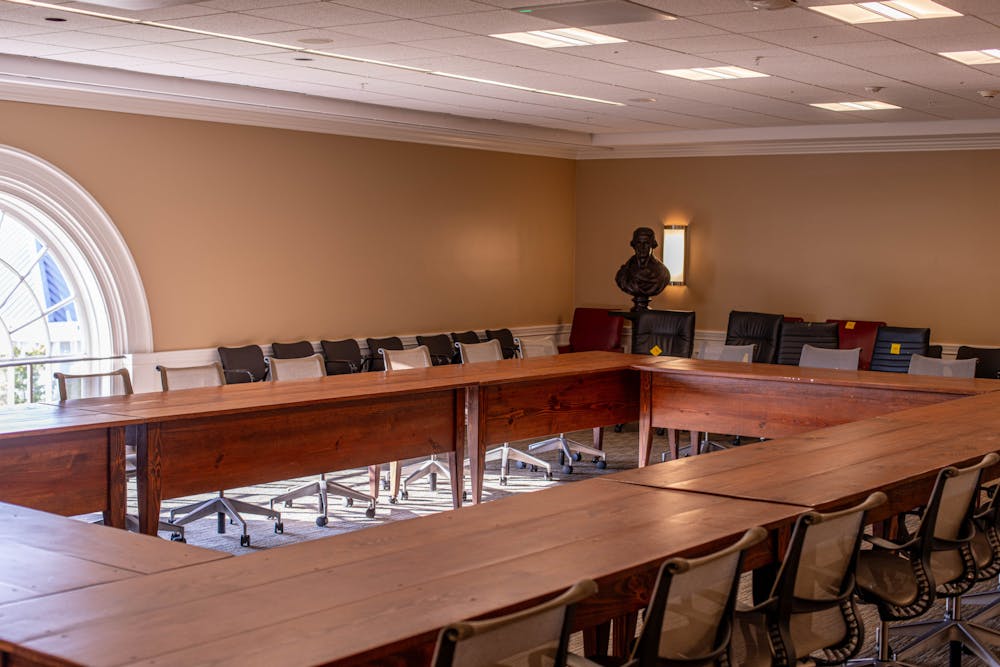The University Judiciary Committee has adjudicated 10 cases this semester and has 17 pending cases. Should the remaining 17 cases become adjudicated by the end of the Fall 2025 semester, this statistic would surpass last year’s Fall 2024 semester, in which 22 cases were adjudicated by the semester’s conclusion.
The UJC is a student-run organization that adjudicates cases involving the 12 Standards of Conduct. Of the 10 adjudicated cases this fall, the most common violations in order of prevalence were of Standards 6, 10 and 2. Of the 17 pending cases, similar Standards were allegedly violated — Standard 2 is the most common, followed by 10 and 6.
According to Saxon Kelleher, senior data manager and second-year College student, these three standards have consistently been the most frequently violated throughout the semester. Standard 2 involves conduct that threatens health or safety, Standard 6 involves a violation of University policy and Standard 10 involves a violation of federal, state or local law.
According to Kelleher, four of the 10 adjudicated cases were cases involving first-year students tried by the First-Year Judiciary Committee. In comparison, the Fall 2024 semester concluded with three adjudicated cases tried by the FYJC. Many of this semester’s cases were accepted at the end of last spring or over the summer, according to Allison McVey, UJC Chair and fourth-year College student. The UJC still categorizes these as FYJC cases, although both the UJC members conducting the trial as well as the student charged with the violation are now second-years.
According to McVey, the 10 cases the UJC has adjudicated so far has made for a case-heavy start to the semester with over a month remaining. Despite last year’s staggering statistic of 22 cases adjudicated, this semester’s adjudicated caseload may reach 27 cases if the remaining 17 cases become finalized. Prior to Fall 2024, the UJC saw far fewer caseloads, as they adjudicated 8 cases both in the Fall 2022 and 2023 semesters.
“[The 10 cases] reflect the fact that it’s been a very busy term in terms of our caseload,” McVey said. “That’s not a huge shift from terms past, but that’s what’s been defining our experience for the past couple of weeks.”
Although the UJC is opaque when discussing cases to maintain student confidentiality, according to McVey, the cases this semester have tended to be more serious. McVey said that the newly recruited members of the UJC will be critical to absorbing the larger and more intense caseload.
“Each individual case demands a lot in the way of resources and time and people,” McVey said. “We’re very grateful to have all of [the newly recruited members] onboarded as of now.”
According to Ella Abney, vice chair for trials, Batten Graduate student and fourth-year College student, the UJC scheduled many cases over the summer to be adjudicated during the Fall semester. Even with this preparation, Abney said that the Committee is at a “breaking point” in terms of caseload, as 17 cases have yet to be finalized.
The UJC also hosted a 70th anniversary celebration Oct. 18, at which Interim University President Paul Mahoney and McVey gave remarks on student self-governance and the establishment of the UJC’s endowment.
According to Zach Davidson, vice chair for first-years and third-year College student, the UJC’s 70th anniversary celebration was a success with around 70 attendees. The event marked the official launch of the UJC’s endowment — an ongoing effort spearheaded by past UJC chair Harper Jones to fund the UJC’s initiatives.
Davidson said that at the event, the Committee shared reasoning for launching the endowment, and a few days after the event, a link was sent to all attendees, giving them the opportunity to contribute.
Davidson said that the UJC is still waiting on initial results of these fundraising efforts because of the UJC’s partnership with the U.Va. Fund.
In the midst of processing cases, the UJC wrapped up recruitment at the end of September, and the new members will complete training for the duration of the Fall semester to be able to staff cases in the spring. The UJC received 201 applications, and 10 educators, 28 counselors, 13 investigators and 12 FYJC members ultimately were accepted to the UJC. According to Taryn Tuttle, senior educator and fourth-year College student, the number of applications received is about on par with last year’s applicant pool size.
The UJC’s general body meetings occur Sundays at 6:30 p.m.







